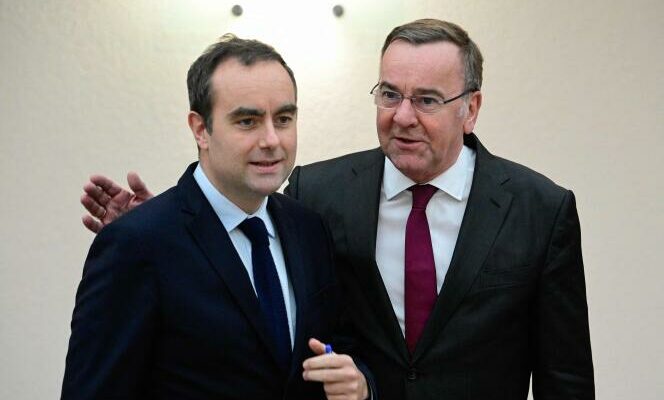The German and French defense ministers announced, Friday March 22, an agreement on the joint tank project of the future, the MGCS (Main Ground Combat System), concerning the distribution of work between manufacturers, a crucial point for unblocking this project until now. here undermined by divergent interests.
“We have agreed on the distribution of all tasks for this major project”declared German Defense Minister Boris Pistorius during a press conference alongside his French counterpart, Sébastien Lecornu.
“We have an agreement and we are happy about it”added Mr. Lecornu, emphasizing the importance of this “structuring program for the land armies of the two countries, fundamentally structuring for Europe, even structuring for NATO [Organisation du traité de l’Atlantique Nord] ».
The MGCS program was launched in 2017, at the same time as the Future Air Combat System (FCAS), another defense cooperation project between the two countries. It aims to replace, from 2035, the French Leclerc tanks and the German Leopard 2, while marking “a generational leap in technology” thanks to his “level of innovation” and his “connectivity”assured the French minister.
A 50/50 split
Last year, Messrs. Pistorius and Lecornu had called for giving new impetus to this Franco-German project hampered by industrial rivalries and the divergent interests of Paris and Berlin.
Financed equally and carried out under German management, it was originally led by KNDS, a holding company created for the occasion between the French Nexter and the German KMW, which manufactures the Leopard 2 battle tank.
The irruption into the program in 2019 of the German manufacturer Rheinmetall destabilized the structure and the planned distributions between manufacturers. The first step was therefore to clarify this question and the agreement reached “establishes very clearly that in terms of production there will be a 50-50 distribution between the industries of different nations”, Mr. Pistorius said on Friday. He recognized that it was “complicated negotiations (…) and difficult ».
This agreement will be formalized by the signing of a joint document on April 26, specified the two ministers.
